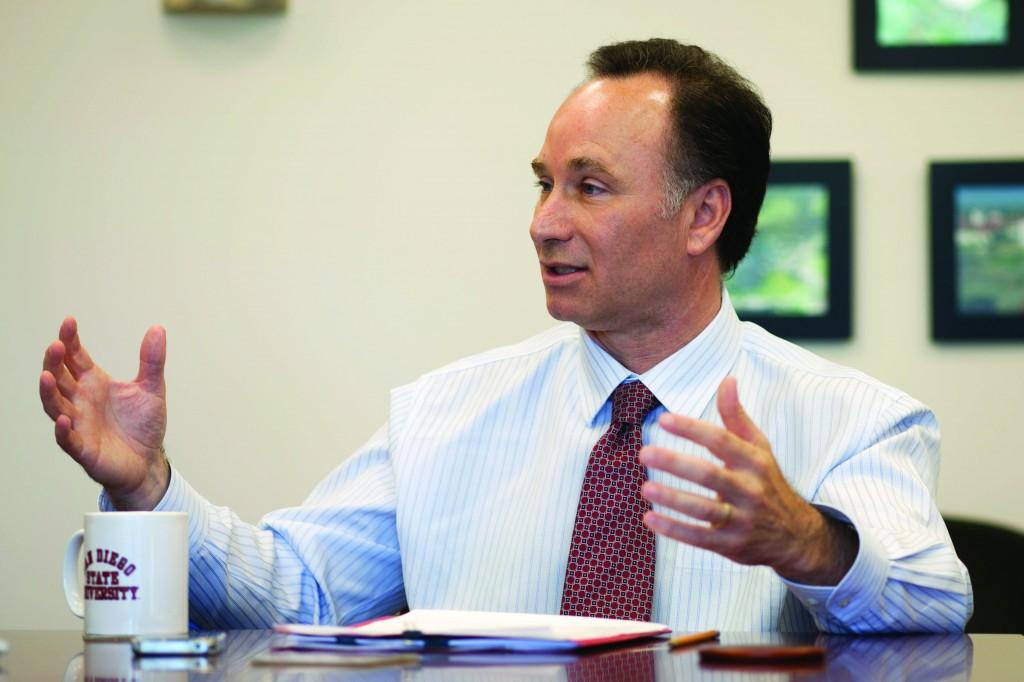“Leadership starts here” is the key slogan of San Diego State, and President Elliot Hirshman has plenty of tips for students on how they can be better leaders at the university, what resume-ready skills they should develop during their time here and how to handle criticism as future leaders—something he is no stranger to.
Hirshman said many of the aptitudes students will learn in college will come from the classroom, but equally important are those that come from interacting with one another and faculty in beyond-classroom experiences.
“Obviously, your classroom experience is paramount, but we want students to be engaged inside and outside the classroom,” Hirshman said. “Thinking about opportunities to study abroad, participating in a research project, pursuing internship opportunities, all of those experiences will prepare students for leadership after they leave here.”
Another option Hirshman said is to become integrated in a student organization. For current or incoming leaders of these groups, having a mission behind the union is important for retention of members and expansion of the organization.
Communicating the organization’s vision in a clear manner is crucial, not only when recruiting members, but also when fundraising, something Hirshman has done \ for the entire university. Last year, the Office of the President fundraised $91 million.
One final step for fundraising is presenting the vehicle for the donation, meaning showing the concrete examples of how the donation will benefit a project, event or, in the university’s case, academic program.
Although he is admired for his ability to improve the university’s finances, many were quick to point fingers when the presidential position’s earnings were raised by California State University board members right when he became SDSU president two years ago.
“Since it’s not intended to be personal, don’t take it personally,” Hirshman said.
That is his first piece of his two-part advice on how to handle criticism.
“On the other hand, if someone takes the time to criticize you, take it seriously. Ask yourself, ‘Could it be that I’ve made the wrong decision here? Or, could it be that I haven’t looked at all the relevant factors?’ That combination can be very powerful,” he added.
Hand in hand with this advice, is his recommendation to include a skill, which many wouldn’t think of integrating in a resume—having a sense of humor.
“Don’t take yourself too seriously,” Hirshman said. “People don’t often list that in their position descriptions, but I think having a sense of humor is very important.”
He added numerous other skills, which could raise potential employers’ eyebrows, but could altogether make students fit candidates for leadership positions.
“I spend a lot of time talking to corporate CEOs, and they are really looking to a great extent for the classical, liberally broadly educated person,” Hirshman said. “They are looking for people who can problem solve, write well, analyze issues, communicate well and who are quantitatively literate.”
Knowing how to problem solve is critical to society, he added.
“Sometimes people will say ‘This is a problem,’ and it will actually be upsetting to them, but they won’t take that step of saying, ‘How can I think about this differently?’” Hirshman said. “I would encourage all students to do that. Really be able to have the cognitive flexibility, the fluidity, to say, ‘We used to do things this way, but now let me think about a different way to do them, so we can address the problem.’”
Once one lands a leadership position, stress might abound, but the advice here is simple—don’t sweat the little stuff.
“For students, don’t feel distress when you get into a job or you are in a managerial circumstance that it seems like there is so much to do—because there is so much to do—but you develop principles for prioritization,” Hirshman said. “You also adjust to the level of stress overtime, and that is something to be mindful of. Don’t expect to be a master of everything at first, but try to make progress, and as you make progress, you’ll be able to mature into the roles.”
Ultimately, nearing the end of college, as consequence of the transformational experience of getting an education, students could begin to feel some disconnection from the communities where they were raised.
“We want this to be an experience where you truly change, but that does produce an interesting quandary, which is you change and there may be a possibility that you will be separated from others in certain ways, so you’ve really got to think about that in a very intentional way, which is, ‘I’ve changed, I’ve learned things, but hopefully one of the things that I’ve learned is how to relate to a lot of different types of people,’” he said.










